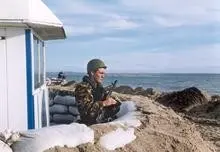Little more than two months before the end of The Year of Russia in Ukraine proclaimed by President Leonid Kuchma, officials in Moscow and Kyiv appear unable to end a dispute over a small island separating the two countries.
Russian Prime Minister Mikhail Kasyanov insisted on Oct. 28 that his Ukrainian counterpart Viktor Yanukovych had agreed in Moscow on Oct. 24 to remove platoons of border guards from Tuzla Island in the Kerch Strait, which separates the Sea of Azov and the Black Sea.
In return for Ukraine’s promised withdrawal of the border troops, Kasyanov promised to halt construction of a 3.7 kilometer-long dike extending from Russia’s mainland toward Tuzla, according to reports in state-controlled Russian media.
“Tuzla is an integral part of Ukrainian territory,” Yanukovych said when he met with and discussed the dispute with his subordinates on Oct. 28.
Foreign Ministry spokesman Markian Lubkyvksy said during a press briefing earlier on Oct. 28 that Kasyanov had promised to unilaterally discontinue construction work, and had only “urged” Ukraine to withdraw its troops from the island.
The government has allocated Hr 5.5 million to beef up border controls on the island, according to Deputy Prime Minister Mykola Azarov, who said on Oct. 25 that the government would spend “whatever amount necessary” to defend its national interests.
Present-day Tuzla was ceded to Soviet Ukraine in 1954 and claimed by Ukraine as its own after the Soviet Union fell apart. Officials in Russia’s Krasnodar oblast dispute the claim.
“This land is drenched in Cossack blood,” oblast Governor Oleksandr Tkachev declared in an Oct. 23 speech delivered at the tip of the breakwater.
Tkachev met with controversial Russian politician Vladimir Zhirinovsky, deputy speaker of the Russian Duma, on Oct. 26. The dispute over Tuzla was the main topic of conversation, according to Krasnodar media, which quoted the lawmaker as saying that the majority of Russian lawmakers supported Tkachev’s position.
Russia’s claim to Tuzla is founded in the fact that the island was part of a long spit that extended from the Russian mainland until 1925, when a storm eroded most of the spit, creating the low-lying island. Just seven kilometers long and 500 meters wide, Tuzla is occupied by several Ukrainian families.
Work crews began construction of the 3.7-kilometer-long earthen dike on Sept. 29, two and a half weeks after Putin and Kuchma met to discuss the legal status of the Sea of Azov. By the time Kuchma cut short a foreign trip to arrive on the scene, Russian workers were 109 meters, or hours, away from completing the earthen breakwater.
Dmitry Rogozin, chairman of the Duma’s international affairs committee, visited the construction site on Oct. 25. He maintained that Ukraine had no right to the island or to control of the Kerch Strait.
Flanked by uniformed Cossacks at the end of the muddy dike, Rogozin told Russia’s RTR television that locals on both sides of the Sea of Azov wanted the two countries to be connected – not separated – by the waterway.
Citing what he said was international maritime law, Rogozin asserted that Ukraine had no right to declare a border in the Sea of Azov.
“The Sea of Azov should be internal waters for both Russia and Ukraine,” he said. “Passage through the Kerch Strait should be absolutely free.”
Ukraine’s Foreign Ministry, meanwhile, said that Russia has yet to submit any documents disproving Ukraine’s claims to the island.
Ukraine has agreed to declare the waters common property, but insists its borders be demarcated on the surface, not the sea floor, as Moscow prefers.
Russian Foreign Minister Igor Ivanov is scheduled to visit Kyiv on Oct. 30 in an attempt to settle the dispute.
Many political pundits believe that there is nothing spontaneous about the Tuzla dispute. Some have raised the possibility that Ukrainian and Russian leaders engineered the crisis and ways to deal with it in advance.
Our Ukraine bloc deputy Mykola Tomenko said on Oct. 29 that Ukrainian officials, at least for now, want to de-emphasize the political and foreign policy aspects of the crisis.
Tomenko, who chairs parliament’s Free Speech and Information committee, said that so-called temniki, or written instructions on what news to cover that are delivered to media by the presidential administration, indicate that initial attempts by pro-presidential media to portray Kuchma as the savior of Ukraine’s territorial integrity failed miserably.
Instructions sent to media on Oct. 28 advised emphasizing that the economic interests of Russian businessmen who own and operate chemical plants in Krasnodar are one of the main causes of the conflict. Instructions issued a day earlier urged media not to report statements made by politicians about Tuzla until after Ivanov arrives in Kyiv.
“Most mass media are convinced that these temniki are coming from the Presidential Administration,” Tomenko told the Post on Oct. 29. “[Rada Speaker Volodymr] Lytvyn is sure, and so is Yanukovych.”
The unusual tensions between Ukraine and Russia come as Ukraine celebrates the Year of Russia in Ukraine, a continuation of the Year of Ukraine in Russia, a program established by Putin in 2002 to promote bilateral ties in culture, education and science through concerts, festivals and academic exchanges.
You can also highlight the text and press Ctrl + Enter




